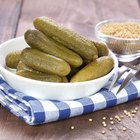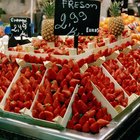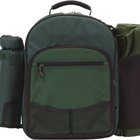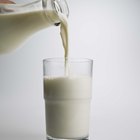
Biodegradable materials are products that decompose naturally through temperature, sunlight or the processes of bacteria, fungi, molds and other living organisms in a process known as composting. Food waste, grass cuttings and tree leaves and branches are all products commonly composted. The Biodegradable Products Institute--a non-profit association of people and groups from government, industry and academia--has certified several types of products that were shown to be biodegradable in a managed composting facility.
Biodegradable Bags
Biodegradable bags and film must meet certified compostable standards, meaning they are able to break down in a managed composting facility. The mention of compostable bags usually brings to mind trash bags and lawn bags, but many new ideas are being implemented, too. Frito-Lay recently introduced a chip bag made entirely out of biodegradable plant materials and Farnell Packaging Limited has films and bags that are aerobically biodegradable.
Food Service Items
Food service items such as trays, disposable cutlery, cups, carryout boxes and even gloves, aprons and hairnets are now being made with biodegradable materials. These products range in design from molded sugarcane and wheat fiber molded plates, bowl, platters, compartment trays and takeout food packaging from Bridge-Gate to grease resistant compostable food wraps from McNairn Packaging.
Resins
Of all the biodegradable products available, resins are perhaps the most important. Resins are materials that are used to make biodegradable bags, films, food service items and many other products. Most resins are melted and then formed into products, using various methods. Some resins are even suitable for injection molding.
Packaging Materials
In a day, Americans throw away 150,000 tons of packaging material, according to the Air & Waste Management Association. Non-recyclable plastics place a big burden on landfills, but this burden is being eased by the increasing use of biodegradable packaging materials. Among the biodegradable products are Plantic's starch-based compostable packaging products and Plastic Suppliers' corn-based flexible and shrink wrap packaging.
Organic Waste
Organic waste such as food, plants, grass clippings and tree leaves is material that breaks down naturally. These items are commonly added to compost piles and require no special treatments or processes to break down. Organic waste makes up around 10 percent of landfill waste and can account for 50 percent of household waste during active growing seasons, according to Purdue University.
Related Articles

List of Biodegradable, Every Day ...

Cellophane vs. Polypropylene

The Disadvantages of Vermicompost

The Advantages of Pickling Foods

What Types of Foam Can Be Recycled?

What Are the Uses of Vermicompost?

Examples of Green Products

What Items Can't Be Recycled?

Uses of Macadamia Nut Shells
What Kind of Cans Are Used for Canned ...

Environmental Impact of Disposable ...

Processed Food Definition

Advantages of Paper Bags vs. Plastic ...

How Many Calories Are in Peanut M&Ms?

What Is Dye Made From?

How to Buy Play-Doh in Bulk

1,000 Denier Cordura Specifications

How Does Flash Pasteurization Work?

List of Ways to Conserve Mother Nature

Plastic Recycling Levels
References
Writer Bio
Based in Texas, Christopher McCurry has been writing professionally since 2004. His articles have appeared in The Lubbock Avalanche Journal, The Fish Wrapper Magazine and ESPN.com. He holds a Bachelor of Science in international economics from Texas Tech University.
Photo Credits
terre image by Claudio Calcagno from Fotolia.com